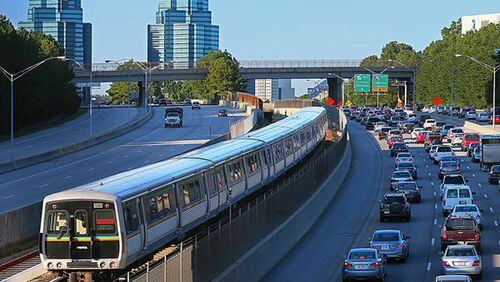Now that voters have approved a plan to increase the sales tax in Fulton County to pay for transportation improvements, leaders are already looking ahead to transit expansion.
Fulton's vice chairman, Liz Hausmann, is coordinating a January trip to Dallas for county mayors and other representatives. About half of the county's 14 cities are already on board for the two-day trip, where they will look at the transit connection between Dallas and Plano, Texas and "have a really in-depth conversation about what transit expansion might mean," Hausmann said.
Fulton county voters last month approved a three-quarter penny sales tax for five years that will pay for repavings, road expansion and other transportation work. Transit improvements aren't included in the plans, though voters in the city of Atlanta approved separate taxes — including one to pay for MARTA expansion — in November, as well.
Outside of Atlanta, the county could still raise taxes by a quarter of a penny before reaching the tax cap, and could use that money to pay for MARTA or other transit needs. To do so, they would need help from the state legislature, which would have to change the law that allows the tax to extend its term, so MARTA could bond against it.
At a Thursday meeting of county mayors and other representatives, leaders agreed to push for that change in this legislative session, in order to get a potential MARTA expansion in Fulton County on the ballot in 2018.
They have also asked the Atlanta Regional Commission to study potential transit connections outside the county, including in Gwinnett and Cobb, and to see whether regional transit plans that have been proposed in the past are still feasible. Though the county leaders don't have purview outside of their jurisdictions, they want to make sure any plans they might make have the potential to connect to new lines in the future.
"Just extending it into North Fulton gets you something, but it doesn't get you to the ultimate solution of a full, regional system," Sandy Springs Mayor Rusty Paul said. "Ultimately, it has to tie in to a regional system, or it's not going to be as effective as it could be."
Jere Wood, Roswell’s mayor, said the conversations needed to be based on technical issues — what methods of transit are the most efficient and cost effective — and not on politics.
With two MARTA expansions approved in recent years, in Clayton County and Atlanta, MARTA CEO Keith Parker said the agency is getting used to the process. The Atlanta expansion and Clayton referendums were both approved with more than 70 percent of the vote.
“We think when transit’s on the ballot, transit wins,” said Robbie Ashe, the chairman of MARTA’s board of directors. “It is a testament to the restoration of the MARTA brand.”
The margin for the county’s transportation tax was thin — 52.7 percent voters approved the three-quarter penny increase. Because of the tight victory, the county is in a position where “we’ve got to really prove ourselves,” said Todd Long, Fulton’s chief operating officer.
Leaders discussed the importance of maintaining a steady drip of good news about the completion of projects throughout the county, even though cities will be collecting taxes and funding projects on their own.
Long urged cities to begin with projects, like repavings, that could have immediate results. He cautioned that high demand for construction services could drive up prices. City leaders floated the idea of contracts that covered work in several cities, as a way to help manage those prices.
The Fulton transportation tax goes into effect April 1 and cities should expect to start seeing money in May.
“We’ve got to deliver these projects on schedule, on budget, the best we can,” Long said.
Fulton County will maintain a website to track the projects and an oversight council with representatives who are not elected officials will serve as a watchdog to track the program's progress. Additionally, the county is required to publish an annual progress report.
“Thanks to everyone, we succeeded, which was good,” Long said. “We’re ready.”
TRANSPORTATION TAXES
Atlanta and Fulton County voters approved three taxes in November. They are:
MARTA in Atlanta, half a penny. It is expected to raise $2.5 billion over 40 years.
Atlanta transportation tax, four-tenths of a penny. It is expected to raise as much as $320 million over five years.
Fulton County transportation tax outside of Atlanta, three quarters of a penny. It is expected to raise as much as $655 million over five years.








